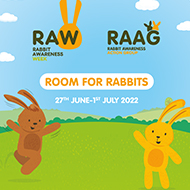
Organisers are encouraging vet practices to support the initiative.
Rabbit Awareness Week (RAW) has gotten underway for 2022, with veterinary practices encouraged to take part and promote this year's theme – Room for Rabbits.
The UK's largest campaign dedicated to rabbit welfare, RAW 2022 (27 June - 1 July) is focused on educating owners to provide their rabbits with a suitable environment, after the latest PDSA PAW Report found that 49 per cent of UK rabbits live alone, and a quarter of UK rabbits are kept in inadequate housing conditions.
The organisers of RAW will share content on its Facebook and Instagram pages, including Q&A sessions with veterinary professionals, blogs and videos on creating great environments for rabbits, including adapting housing for all seasons.
With plenty of time to get involved, RAW organisers are encouraging veterinary practices to download a free RAW pack and speak to clients about rabbit housing and welfare.
Beginning with information on keeping rabbits' housing clean and in good condition, the first day of RAW is providing owners with a cleaning schedule for rabbit housing, with plenty of top tips offered throughout the day.
Creating a suitable set-up in both indoor and outdoor environments, including enrichment ideas and litter training, will be the focus of days two and three, and adapting rabbits' housing for all seasons will be the focus of day four.
On RAW's final day, it will focus on creating or extending a welfare-rich environment on a budget.
Promoting the Room for Rabbits theme, the RSPCA is marking Rabbit Awareness Week by highlighting the large number of rabbits coming into its care.
Dr Jane Tyson, RSPCA rabbit welfare expert, said: “It’s more important than ever on this Rabbit Awareness Week that we spread the message to people to do their research before taking on a pet.
“Rabbits can live for a long time and can be costly, they need much more than just a hutch at the end of the garden - they need space, companionship and enrichment to live happy and healthy lives.”
Images (C) Rabbit Awareness Week/RAAG



 The veterinary mental health charity Vetlife is inviting the veterinary community to join it for a sponsored cold-water dip.
The veterinary mental health charity Vetlife is inviting the veterinary community to join it for a sponsored cold-water dip.